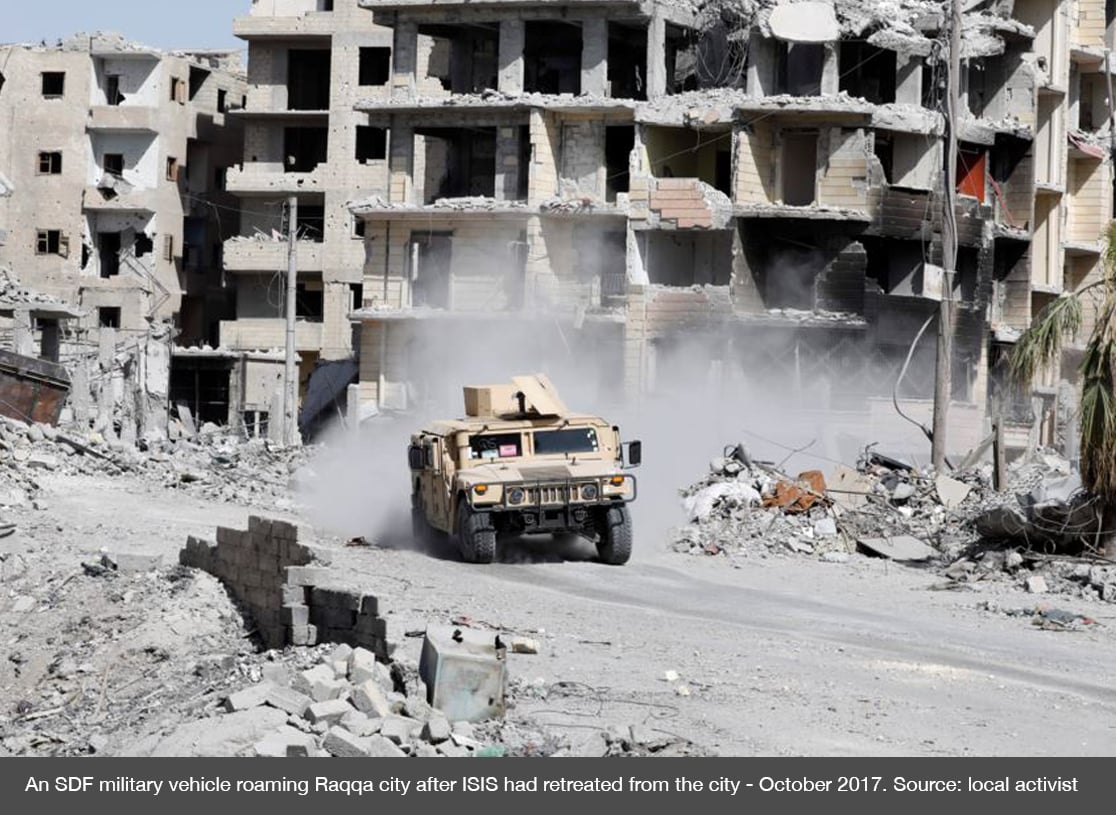2,371 Civilians Killed, Including 562 Children, and Nearly Half a Million Displaced

SNHR has noted in a report, “Ridding Raqqa of ISIS Costed Extraordinarily Too Much in Lives and Resources”, released today that no less than 2,371 civilians were killed, including 562 children, while nearly 500,000 were displaced in light of the battles that took place in Raqqa governorate within a year time.
The report notes that Raqqa governorate was clearly divided among the parties to the conflict, where certain areas went to certain parties, even if this wasn’t categorically announced, as international coalition forces and Syrian Democratic Forces (SDF) focused their attacks on the northern, western, and southern suburbs, as well as the city of Raqqa, while the Syrian-Russian alliance forces’ attacks were concentrated in the eastern suburbs – particularly in the villages that are located to the south of Euphrates River (Called Shamiya villages).
According to the report, the offensives carried out by the parties to the conflict over the course of 11 months have displaced approximately 450,000 people. International coalition forces were responsible for the displacement of two-thirds, while the attacks of the Syrian-Russian alliance resulted in displacing the remaining one-third.
The report draws primarily upon on the daily documentation and monitoring that SNHR team works on in a daily, ongoing, cumulative manner. Secondly, the report is based on accounts from survivors, eyewitnesses, and local media activists that we have talked to via phone or social media. We also analyzed a number of videos and pictures that were posted online, or were sent to us by local activists via e-mail, Skype, or social media.
The report records the violations of the first battles of Raqqa, November 6, 2016 – October 19, 2017, by the parties to the conflict, as 2,323 civilians were killed in these battles, including 543 children and 346 women (adult female), while 99 massacres at least were recorded. International coalition forces were responsible for the killing of 1,321 civilians, including 383 children and 247 women, and had perpetrated 87 massacres, while Syrian Democratic Forces (SDF) killed 309 civilians, including 51 children and 50 women, and were responsible for four massacres. ISIS, on the other hand, killed 639 civilians, including 109 children and 49 women, and was responsible for eight massacres.
In the same period of time, the report documents no less than 100 attacks on vital civilian facilities, including 81 at the hands of international coalition forces, while SDF were responsible for seven attacks, and ISIS was responsible for the remaining 12.
According to the report, no less than 1,896 individuals were arrested, including 28 children and 33 women in the same period of time. Out of those, 1,279 individuals were arrested by SDF, including 19 children and 22 women, while ISIS arrested 617 individuals, including nine children and 11 women.
Additionally, the report outlines the details of the second battle of Raqqa which was waged by Syrian-Russian alliance forces between July and October of 2017, as the Syrian-Russian alliance’s offensive enabled it to take over the majority of the areas in the eastern suburbs which are located to the south of Euphrates River. According to the report, Syrian-Russian alliance forces killed 48 civilians, including 19 children and eight women (adult female), and was responsible for no less than five massacres, while these forces carried out 11 attacks on vital civilian facilities in the same period of time.
The report stresses that the parties to the battle of Raqqa have perpetrated serious and various violations to the international human rights law and the international humanitarian law that constitute war crimes. The parties directed multiple attacks at civilian residents, including aerial bombardment and ground-to-ground shelling against populated areas. These forces didn’t alarm the residents prior to the attacks as it is required by the international humanitarian law.
The report adds that the attacks by the alliance forces (the international coalition and SDF) and the Syrian-Russian alliance have resulted in collateral damages that involved loss of lives, injuries, or heavy damages to civilian objectives. There are strong indicators suggesting that the damage was too excessive compared to the anticipated military benefit.
Further, the report notes that ISIS was responsible for a wide range of violations to the international humanitarian law against the residents in its areas of control through killing, arrest, and torture. We also recorded that ISIS barred residents from fleeing its areas of control in order to use them as human shields.
In addition, the report stresses that Syrian-Russian alliance forces should immediately cease carrying out indiscriminate attacks, and stop using ISIS as a pretext to bomb residential neighborhoods and vital civilian facilities.
In contrast, the report calls on the alliance forces (the international coalition and SDF) to unequivocally and truly acknowledge that some of the bombardment operations have resulted in the killing of innocent civilians. Denying so won’t do any good for these governments, as documented human rights reports and residents’ accounts explicitly expose this fact. Instead of denying, these states should take speedy steps to launch serious investigations, and immediately compensate and apologize to the victims and those who were affected.
The report calls on the SDF-supporting states should apply pressure on these forces in order to compel them to cease all of their violations in all the areas and towns that are under their control. Also, local council from the local community should be formed in order to establish a civil governance. Also, the report calls for ceasing all forms of support, weapons and otherwise, ceased until SDF commit to the previous recommendations. This is primarily the supporting states’ responsibility. Additionally, the report stresses that SDF should improve the living situation in the camps that are under their administration. And allow IDPs to move freely and secure food and medical aids.
Lastly, the report calls on the international relief organizations should find ways to secure food, water, and shelter for thousands of IDPs who are stranded on the banks of Euphrates River and the desert areas.


